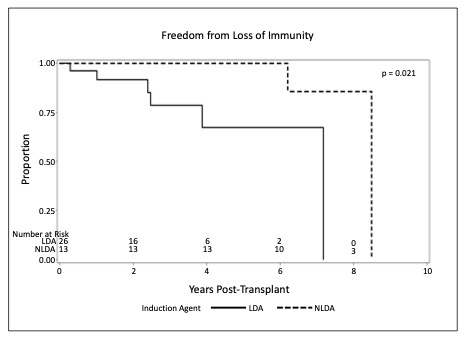Risk Factors for Losing Varicella Immunity after Pediatric Kidney Transplantation
1Pediatric Nephrology, Cedars-Sinai Medical Center, Los Angeles, CA, 2Biostatistics Core, Research Institute, Cedars-Sinai Medical Center, Los Angeles, CA, 3Pediatric Infectious Disease, Cedars-Sinai Medical Center, Los Angeles, CA
Meeting: 2020 American Transplant Congress
Abstract number: C-049
Keywords: IgG, Vaccination
Session Information
Session Name: Poster Session C: Kidney: Pediatrics
Session Type: Poster Session
Date: Saturday, May 30, 2020
Session Time: 3:15pm-4:00pm
 Presentation Time: 3:30pm-4:00pm
Presentation Time: 3:30pm-4:00pm
Location: Virtual
*Purpose: Vaccination against varicella zoster (VZV) pre-kidney transplant (kid tx) can help prevent severe disseminated VZV disease in immunosuppressed patients (pts) post-tx. Despite confirmation of serologic response to vaccinations pre-tx, studies have shown loss of humoral immunity (imm) post-tx. Here we assess risk factors for losing VZV imm after pediatric (ped) kid tx.
*Methods: A retrospective analysis of 44 ped kid tx pts with positive pre-tx VZV IgG (> 0.9 index) was performed. Pts were induced with a lymphocyte depleting (LDA: ATG or alemtuzumab) or non-lymphocyte depleting agent (NLDA: basiliximab or daclizumab) and maintained on mycophenolate mofetil, tacrolimus, with or without steroids. Loss of VZV imm (VZV IgG < 0.9 index) post-tx was evaluated based on 1) induction agent used 2) number of VZV vaccines (vx) received prior to tx 3) interval between last dose of VZV vx and tx 4) if pt received treatment for rejection.
*Results: Median age at tx was 10.8 yrs (1.1-19.5); 25 were male (56.8%); 38 (86.4%) received deceased donor tx; 26 (59%) received LDA; 12 (28.6%) received 1 VZV vx prior to tx; 10 (22.7%) received their last VZV vx ≤ 1 year prior to tx. Loss of VZV imm was 4.7%, 14.2%, and 29.2% at 2, 4 and 8 yrs post-tx, respectively. In a subgroup analysis comparing the induction agent used, loss of imm appeared to occur earlier in the LDA group (Figure 1, p = 0.021). Loss of VZV imm in those who received 1 VZV vx prior to tx was 0%, 9.1%, and 27.3% at 2, 4, and 8 yrs post-tx, respectively, vs. 6.9%, 18.1% and 31.8% in those that received ≥ 2 (p = 0.88). Among those that received their last VZV vx ≤ 1 year prior to tx, loss of VZV imm was 0%, 27.1% and 27.1% at 2, 4, and 8 yrs post-tx, respectively, compared to 6.3%, 10.6%, and 33% in those that received their last VZV vx > 1 yr prior to tx (p = 0.61). Seven of 19 pts who had been treated for rejection lost VZV imm vs. 4 of 25 who did not have rejection (HR = 7.27; 95%CI 1.84-28.77; p = 0.005).
*Conclusions: Ped kid tx pts are at risk for losing VZV imm post-tx, particularly over time. It appears that the loss of imm occurs earlier in those who receive LDA. There was no evidence that the number of VZV vx received prior to tx or the timing between the last VZV vx and tx influences the loss of imm. Receiving treatment for rejection increases the risk for losing VZV imm. Post-tx VZV serologies should be monitored to identify pts at highest risk for disseminated VZV, particularly after treatment for rejection.
To cite this abstract in AMA style:
Pizzo H, Mirocha J, Garrison J, Soni PR, Nadipuram S, Puliyanda D. Risk Factors for Losing Varicella Immunity after Pediatric Kidney Transplantation [abstract]. Am J Transplant. 2020; 20 (suppl 3). https://atcmeetingabstracts.com/abstract/risk-factors-for-losing-varicella-immunity-after-pediatric-kidney-transplantation/. Accessed July 9, 2025.« Back to 2020 American Transplant Congress

